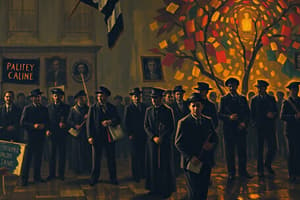Podcast
Questions and Answers
What is the primary reason for the need for a national ideology in the Philippines?
What is the primary reason for the need for a national ideology in the Philippines?
- To support military actions.
- To ensure the success of government programs. (correct)
- To promote tourism.
- To intimidate opposition parties.
Which ideal is considered primordial for the Filipino ideology?
Which ideal is considered primordial for the Filipino ideology?
- Liberty.
- Patriotism.
- Nationalism.
- Egalitarianism. (correct)
What does the humanistic principle in Filipino ideology emphasize?
What does the humanistic principle in Filipino ideology emphasize?
- Economic growth over human rights.
- Human beings as tools for progress.
- Complete government control over society.
- Human rationality and creativity. (correct)
How should human rights be viewed according to the ideology discussed?
How should human rights be viewed according to the ideology discussed?
What does the egalitarian ideal propose for the future of the Philippine society?
What does the egalitarian ideal propose for the future of the Philippine society?
What is indicated as a legitimate exercise of government power in the Philippines?
What is indicated as a legitimate exercise of government power in the Philippines?
What aspect does the ideology emphasize in relation to individuals?
What aspect does the ideology emphasize in relation to individuals?
What ultimately underpins the egalitarian ideal according to the text?
What ultimately underpins the egalitarian ideal according to the text?
What were the primary objectives of the survey?
What were the primary objectives of the survey?
Which socioeconomic group emphasized self-fulfillment the most in their values?
Which socioeconomic group emphasized self-fulfillment the most in their values?
What do the majority of respondents believe will hinder the application of their principles?
What do the majority of respondents believe will hinder the application of their principles?
What percentage of respondents believe their values align with those of most Filipinos?
What percentage of respondents believe their values align with those of most Filipinos?
What consequences do respondents foresee for those who deviate from shared Filipino values?
What consequences do respondents foresee for those who deviate from shared Filipino values?
What is the desired shift in loyalty mentioned by the respondents?
What is the desired shift in loyalty mentioned by the respondents?
What role do respondents believe the government should play regarding values of equality and social justice?
What role do respondents believe the government should play regarding values of equality and social justice?
How do respondents describe their collective identity as Filipinos?
How do respondents describe their collective identity as Filipinos?
What is the primary goal of development as outlined in the Philippine Development Plans?
What is the primary goal of development as outlined in the Philippine Development Plans?
Which of the following best describes the Kantian vision of society?
Which of the following best describes the Kantian vision of society?
What does the Philippine Development Plans suggest is necessary for real societies to function effectively?
What does the Philippine Development Plans suggest is necessary for real societies to function effectively?
What type of industries is the Philippine Development Plan expected to focus on in the industrial sector?
What type of industries is the Philippine Development Plan expected to focus on in the industrial sector?
What is the intended outcome of the shift toward second-stage import substitution in the next five years?
What is the intended outcome of the shift toward second-stage import substitution in the next five years?
Which of the following is emphasized as a responsibility of the government in the Philippine Development Plans?
Which of the following is emphasized as a responsibility of the government in the Philippine Development Plans?
What aspect of development does the Philippine Development Plans highlight apart from economic growth?
What aspect of development does the Philippine Development Plans highlight apart from economic growth?
What is one key purpose of the Normative Value Consensus survey?
What is one key purpose of the Normative Value Consensus survey?
What does the declaration of martial law signify in the context of societal change?
What does the declaration of martial law signify in the context of societal change?
How is the concept of a dictatorship of the proletariat typically justified?
How is the concept of a dictatorship of the proletariat typically justified?
What is the main distinction of the Democratic Revolution in the Philippines compared to other revolutionary models?
What is the main distinction of the Democratic Revolution in the Philippines compared to other revolutionary models?
What is a primary characteristic of societies as described in the content?
What is a primary characteristic of societies as described in the content?
What does the idea of anarchy suggest about human interaction?
What does the idea of anarchy suggest about human interaction?
What misunderstanding do some have about the nature of the revolution discussed?
What misunderstanding do some have about the nature of the revolution discussed?
Which ideology posits that individuals are perfect rational beings capable of self-assessment?
Which ideology posits that individuals are perfect rational beings capable of self-assessment?
What role does government play in the dichotomy between the rich and the poor?
What role does government play in the dichotomy between the rich and the poor?
Flashcards are hidden until you start studying
Study Notes
Filipino Ideology
- The need for a national ideology in the Philippines stems from the desire for unity and direction, aiming to build a cohesive and prosperous nation.
- The primordial ideal in Filipino ideology is humanism, placing the human being at the center of all concerns and actions.
- The humanistic principle in Filipino ideology emphasizes the inherent dignity and worth of every individual.
- Human rights, according to this ideology, should be viewed as inalienable rights inherent to every human being, not granted by the state or any other entity.
- The egalitarian ideal proposes a future Philippine society where opportunities are equally accessible to all, regardless of background or social status.
- The legitimate exercise of government power in the Philippines is to safeguard and promote the welfare of all Filipinos.
- This ideology emphasizes individual responsibility and the importance of contributing to the greater good.
- The egalitarian ideal is ultimately underpinned by the belief in the inherent worth and equal dignity of all human beings.
Societal Values are the fundamental beliefs and principles that guide an individual's behavior and decision-making processes. They play a crucial role in shaping personal identity and influencing social interactions. In the context of Filipino society, values often reflect a blend of cultural heritage, historical influences, and contemporary societal challenges. Common values may include family loyalty, respect for elders, community involvement, and a strong sense of hospitality. Understanding these values is essential for recognizing how they affect interpersonal relationships, societal norms, and the collective goals of a nation. Additionally, they can illuminate the ways in which Filipinos navigate issues of social justice, equality, and community welfare.
- The primary objectives of the survey were to understand Filipinos' shared values and their implications for the future of the nation.
- The socioeconomic group that emphasized self-fulfillment the most in their values was the high-income group.
- The majority of respondents believe the lack of trust and corruption will hinder the application of their principles.
- 70% of respondents believe their values align with those of most Filipinos.
- Respondents foresee social ostracization and potential legal consequences for those who deviate from shared Filipino values.
- Respondents desire a shift in loyalty from personal interests to the collective good of the nation.
- Respondents believe the government should actively promote the values of equality and social justice through policy and action.
- Respondents describe their collective identity as Filipinos through shared history, culture, and values.
Philippine Development Plans
- The primary goal of development as outlined in the Philippine Development Plans is to achieve sustainable and inclusive growth that benefits all Filipinos.
- The Kantian vision of society, as described in the context, envisions a society where individuals are treated as ends in themselves, and not merely as means to an end.
- The Philippine Development Plans suggest that social justice and equitable distribution of resources are necessary for real societies to function effectively.
- Second-stage import substitution is expected to focus on developing industries that can produce goods for export and generate foreign currency.
- The intended outcome of the shift toward second-stage import substitution in the next five years is to boost economic growth and create more employment opportunities.
- The responsibility of the government in the Philippine Development Plans is to facilitate a favorable environment for economic growth and social development.
- Human development is highlighted as a key aspect of development alongside economic growth in the Philippine Development Plans.
Societal Change & Revolution
- The Normative Value Consensus survey aims to understand the shared values of Filipinos and their implications for societal change.
- The declaration of martial law signifies a shift in power dynamics and potential restrictions on individual freedoms.
- The concept of a dictatorship of the proletariat is typically justified by the need to overthrow the existing power structure and establish a more equitable society.
- The Democratic Revolution in the Philippines stands apart from other revolutionary models because it emphasizes peaceful and non-violent methods to achieve social change.
General Concepts
- One primary characteristic of societies is the existence of shared norms, values, and beliefs that govern individual behavior.
- The concept of anarchy suggests a lack of formal government or authority, leading to potential chaos and instability.
- Some misunderstand the nature of the revolution discussed by misinterpreting it as a violent uprising aimed at overthrowing the existing government.
- The ideology that posits individuals are perfect rational beings capable of self-assessment is classical liberalism.
- Government's role in the dichotomy between the rich and the poor is critical in promoting social mobility and economic equality.
Studying That Suits You
Use AI to generate personalized quizzes and flashcards to suit your learning preferences.




